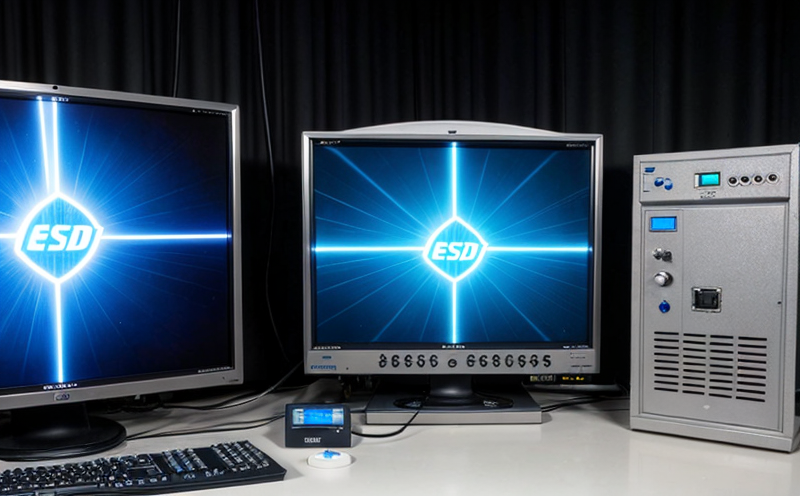ISO 7637-3 Road Vehicle Electrical Surge Testing
The ISO 7637-3 standard is a critical specification used in the automotive industry to ensure that electrical components within vehicles are robust and reliable. This standard defines specific surge voltage conditions, which simulate real-world scenarios such as lightning strikes or power supply fluctuations. The primary objective of this testing is to assess how well electronic components can withstand these harsh transient events without failing.
The test involves subjecting the vehicle's electrical system to controlled surges that mimic those encountered in adverse environmental conditions. These surges are typically generated by a pulse generator, which delivers high-intensity pulses designed to stress the circuitry under test. The testing protocol is stringent and follows detailed procedures outlined in ISO 7637-3. Compliance with this standard ensures that vehicles meet safety requirements set forth by regulatory bodies like the ECE (Economic Commission for Europe).
During the test, various parameters are monitored to ensure accurate evaluation of component performance. Key metrics include resistance values, capacitance levels, and inductance readings before and after exposure to surge conditions. Additionally, voltage measurements across critical points within the circuit provide insights into potential damage or degradation caused by surges.
Proper preparation of specimens is crucial for obtaining reliable results during ISO 7637-3 testing. Components under test must be securely mounted onto a suitable test fixture designed to replicate their actual installation environment in vehicles. This ensures that the components experience stress conditions similar to those they would face when installed in real cars.
Instrumentation plays a vital role in executing ISO 7637-3 testing effectively. High-quality pulse generators capable of producing precise, repeatable surge waveforms are essential for accurate measurement and analysis. Data acquisition systems equipped with specialized software for recording test data further enhance the precision of results.
Reporting is an integral part of ISO 7637-3 compliance testing. Detailed reports summarize test conditions, observed phenomena, and conclusions drawn from analyses performed during the process. These reports serve as valuable resources not only for meeting regulatory requirements but also for improving product design through informed decision-making based on empirical evidence gathered.
For quality managers responsible for maintaining high standards in automotive manufacturing processes, ensuring adherence to ISO 7637-3 is paramount. By integrating this testing into their quality assurance programs, companies can enhance customer confidence by demonstrating commitment to producing safe and reliable products that meet stringent industry expectations.
Eurolab Advantages
At Eurolab, we pride ourselves on delivering comprehensive and accurate ISO 7637-3 testing services tailored specifically to the needs of our clients. Our state-of-the-art facilities are equipped with cutting-edge equipment capable of simulating a wide range of surge conditions, ensuring precise and reliable results.
Our team of experienced engineers specializes in understanding both the theoretical aspects of ISO 7637-3 standards as well as practical applications within automotive manufacturing contexts. This expertise allows us to provide customized solutions that address unique challenges faced by different clients across various segments of the industry.
We offer flexible scheduling options to accommodate busy production schedules while maintaining rigorous quality control measures throughout each project phase. From initial consultation through final report generation, we ensure seamless integration into existing workflows without disrupting ongoing operations.
Our commitment to excellence extends beyond technical capabilities; it encompasses unwavering dedication towards delivering exceptional customer service experiences. Clients can expect prompt communication channels, transparent billing practices, and proactive support whenever needed throughout the entire testing process.
International Acceptance and Recognition
The ISO 7637-3 standard has gained widespread acceptance among automotive manufacturers worldwide due to its comprehensive approach in evaluating vehicle electrical systems' resilience against transient events. Regulatory authorities such as the ECE recognize compliance with this standard as evidence of adherence to global safety standards.
Automakers and suppliers who pass ISO 7637-3 testing gain significant competitive advantages by demonstrating their products meet stringent international requirements. This certification helps build trust among consumers, investors, and other stakeholders regarding the reliability and durability of automotive electronics.
Moreover, compliance with ISO 7637-3 facilitates smoother market entry into countries where these regulations are enforced rigorously. It serves as a stepping stone for companies looking to expand their presence in international markets without compromising on product quality or regulatory compliance.
The standard's broad applicability across various types of vehicles—from passenger cars to commercial trucks—ensures consistent testing protocols regardless of the specific make or model being evaluated. This uniformity simplifies the process for manufacturers and facilitates easier collaboration between different stakeholders involved in automotive development projects.
Use Cases and Application Examples
The ISO 7637-3 standard finds extensive application across multiple sectors within the automotive industry, including OEMs (Original Equipment Manufacturers), Tier 1 suppliers, and independent testing laboratories specializing in vehicle electrical systems.
One common use case involves ensuring that onboard electronics remain functional after exposure to lightning strikes or other transient voltage events. By subjecting components to controlled surge conditions according to ISO 7637-3 guidelines, manufacturers can identify potential weaknesses early on and implement necessary improvements before mass production begins.
In another scenario, automotive suppliers may utilize this testing method during product development stages to evaluate new designs or modifications aimed at enhancing reliability. Such tests help validate design changes against established performance criteria set forth by the standard.
Additionally, ISO 7637-3 compliance is often required when submitting applications for type approval from governmental agencies responsible for regulating vehicle safety standards. Meeting these requirements ensures that products meet all necessary regulatory thresholds before being allowed on public roads.
For independent testing laboratories, ISO 7637-3 serves as a benchmark against which they can measure the robustness of various components used in modern automobiles. By adhering to this standard during their evaluations, labs contribute valuable data points that help inform broader industry trends and best practices.





